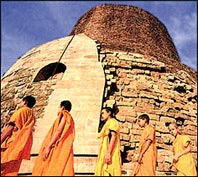 After attaining enlightenment at Bodh Gaya the Buddha went to Sarnath; and it was here that he preached his first discourse in the deer park to set in motion the 'Wheel of the Dharma'. It is one of the most holy sites as in this place the stream of the Buddha's teaching first flowed.
After attaining enlightenment at Bodh Gaya the Buddha went to Sarnath; and it was here that he preached his first discourse in the deer park to set in motion the 'Wheel of the Dharma'. It is one of the most holy sites as in this place the stream of the Buddha's teaching first flowed.
At this place, the Buddha encountered the five men who had been his companions of earlier austerities. On meeting the enlightened Buddha, all they saw was an ordinary man; they mocked his well-nourished appearance. "Here comes the mendicant Gautama," they said, "who has turned away from asceticism. He is certainly not worth our respect." When they reminded him of his former vows, the Buddha replied, "Austerities only confuse the mind. In the exhaustion and mental stupor to which they lead, one can no longer understand the ordinary things of life, still less the truth that lies beyond the senses. I have given up extremes of either luxury or asceticism. I have discovered the Middle Way". Hearing this the five ascetics became the Buddha's first disciples.
Gautama Buddha started teaching not to debate but for the advantage of and out of compassion for human beings. He explained the middle way which avoids extremes, the Four Noble Truths, and prescribed the Eight-fold path. The Four Noble Truths are: 1. There is suffering; 2. Suffering has a cause; 3. The cause is removable, and 4. There are ways to remove the causes. So as to remove the causes the Buddha prescribed an Eight-fold Path: Right speech, Right action, Right livelihood, Right effort, Right mindfulness, Right concentration, Right attitude and Right view.
A Monastic tradition flourished for over 1,500 years on the site of the deer park at Sarnath. In the third century BC Ashoka erected a column 15.24 m in height which had four lions as its capital which is now treasured in the archaeology museum. The lion symbolises both Ashoka's imperial rule and the kingship of the Buddha. The four-lion capital was adopted as the emblem of the modern Indian republic. The last and largest monastery constructed before the Muslim invasion was Dharma-Chakar-Jina Vihar, erected by Kumardevi, wife of King Govinda Chandra, who ruled over Benares during 1114 to 1154. In 1194 AD, Kutubuddin Aibak, the Muslim conqueror, leveled the city to the ground. Sarnath became a forest of debris below which the historical ruins remained buried. Of the two great stupas which adorned the city only the Dhamekha remained which is of the 6th century.
The Dhamekha Stupa
 This is the most conspicuous structure at Sarnath. Colonel Cunningham bore a shaft from the top centre of the stupa and discovered a stone tablet on which an inscription is written with the word Dhamekha, and mentions that this is the spot where the Buddha delivered his first sermon. Dhamekha seems to be a distorted form of Dharma Chakra which means turning the wheel of the Dharma. It is also said that at this spot the five ascetics who left Gautama Buddha in Bodh Gaya used to live in huts. The original stupa was constructed by Ashoka. The present size of the stupa is 31.3 m high and 28.3 m in diameter. The lower portion of the stupa is covered completely with beautifully carved stones. The design consists of a broad band of Swastika (fylfot) carved in different geometrical patterns with a finely chiselled lotus wreath, running over and below the swastikas.
This is the most conspicuous structure at Sarnath. Colonel Cunningham bore a shaft from the top centre of the stupa and discovered a stone tablet on which an inscription is written with the word Dhamekha, and mentions that this is the spot where the Buddha delivered his first sermon. Dhamekha seems to be a distorted form of Dharma Chakra which means turning the wheel of the Dharma. It is also said that at this spot the five ascetics who left Gautama Buddha in Bodh Gaya used to live in huts. The original stupa was constructed by Ashoka. The present size of the stupa is 31.3 m high and 28.3 m in diameter. The lower portion of the stupa is covered completely with beautifully carved stones. The design consists of a broad band of Swastika (fylfot) carved in different geometrical patterns with a finely chiselled lotus wreath, running over and below the swastikas.
The Dhamekha stupa is considered to be the sacred place where the voice of Buddhism was first heard. Many dignitaries of Buddhist countries visit this place for circumambulation of this sacred stupa and to worship the Buddha. Tibetans Buddhist circumambulate it chanting the mantra 'Om mani padme hum'. The first discourse of the Buddha was on the 'Wheel of Law'. The wheel symbolises samsara (world), the eternal round of existence which goes on and on, life after life because of ceaseless cravings and desire.
Very nice blog sir, it is very helpful to understand the buddhism. i am belong form uttarakhand the place is Jim Corbett National Park which is full of natural beauty.
ReplyDelete